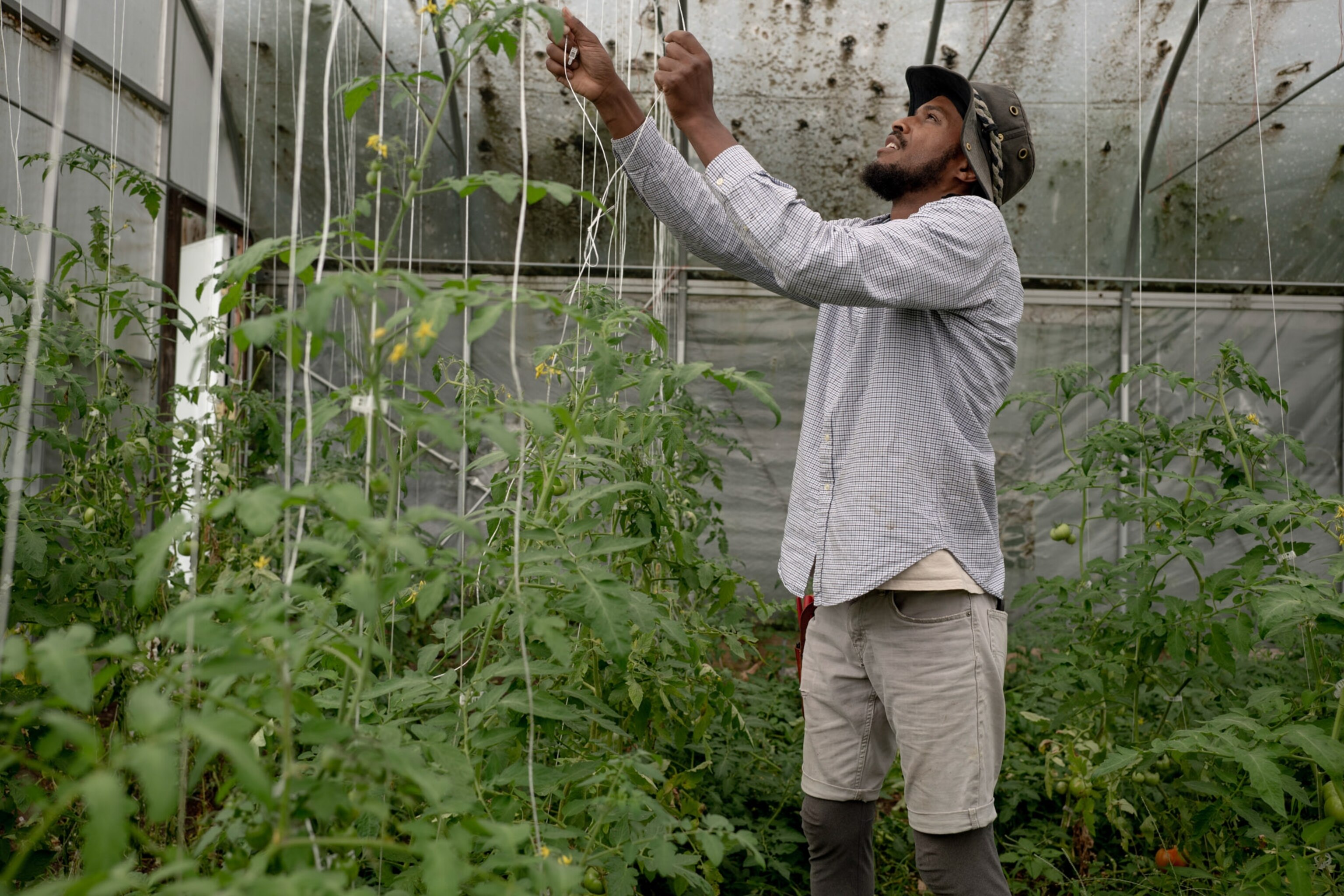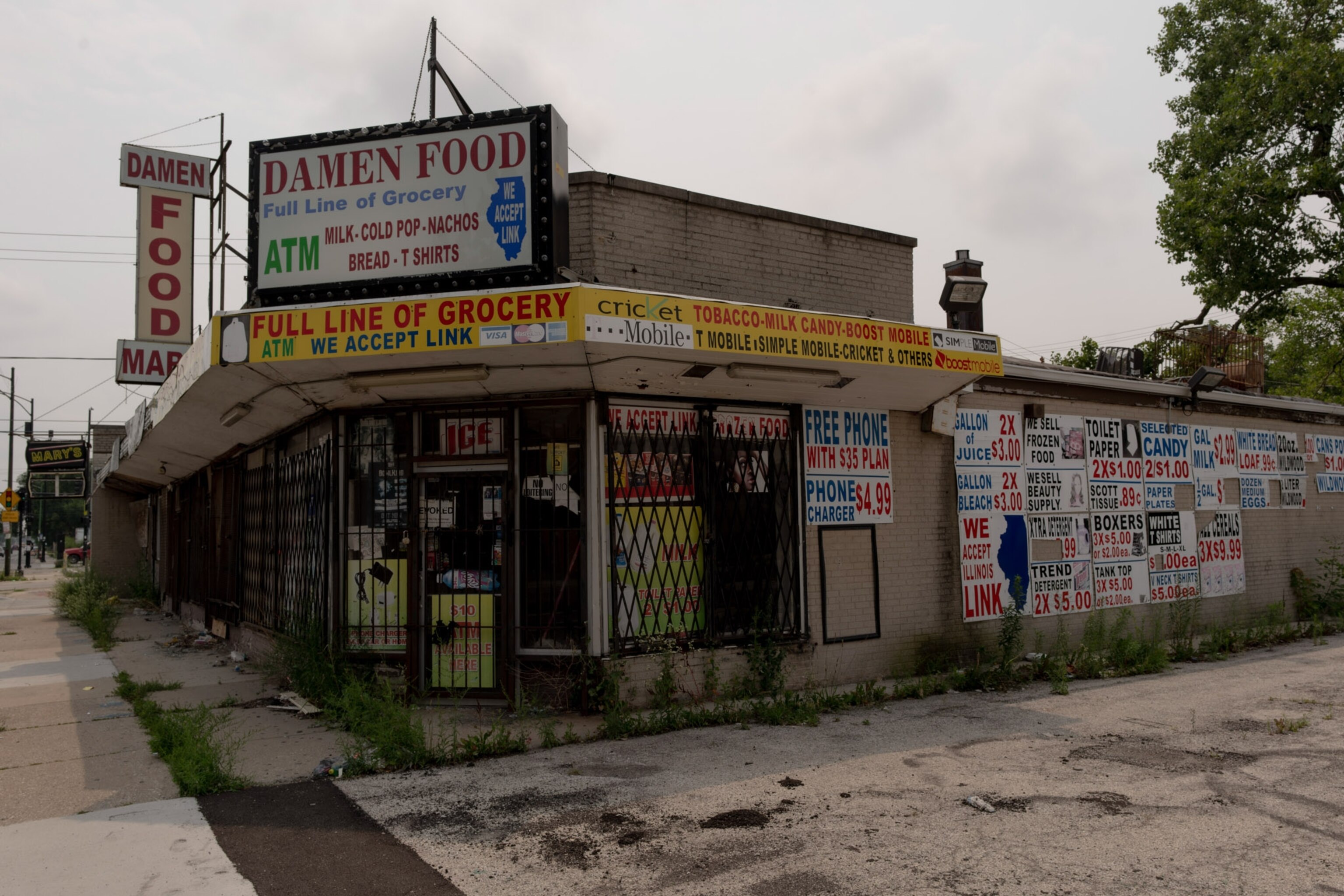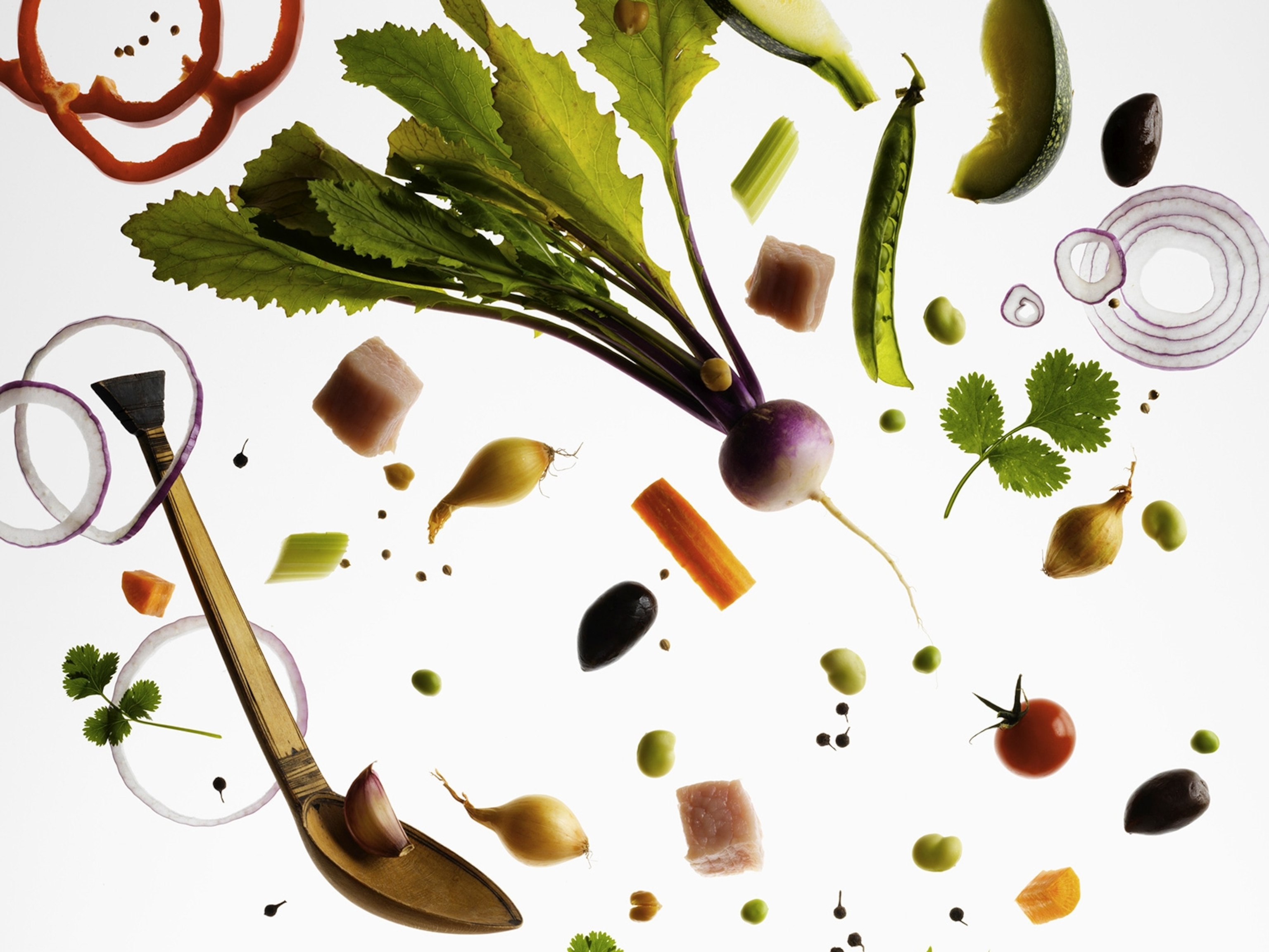Grassroots efforts take on ‘food apartheid’ in Chicago’s South Side
Access to healthy food is limited in less affluent neighborhoods across the nation. Community efforts in Chicago are making a difference.
Chicago resident Asiaha Butler has lived most of her life in Englewood, Illinois, a predominantly Black neighborhood on Chicago's South Side with a median household income of $21,275. Crime had been a problem, and for a time Butler considered moving to a suburb.
"There was a point where I wanted to leave, and I felt that the community didn't have anything to offer me nor my family,” Butler says. “I was living in fear.”

Security concerns weren’t the only thing weighing on Butler. She also wanted to live a healthy lifestyle, but the local grocery store offered little in the way of fresh vegetables, fruit, and organic produce—as is often the case in lower-income neighborhoods in Chicago and across the nation.
Butler was ready to move away from Englewood, but she had a revelation while looking out the window of her house one day. She saw children across the street, including a girl playing in the dirt. The scene moved her and led to a change of heart. Rather than abandon Englewood, she would stay and work to provide better opportunities for her community.
In 2010 Butler co-founded R.A.G.E. (Residential Association of Greater Englewood), an organization that strategizes to address community problems, create tangible solutions, and keep residents informed about what's happening in their area.

One of the first issues the organization tackled was the lack of healthy food options in Englewood. Many refer to such places as “food deserts.” Butler and other Chicago activists refer to the phenomenon as “food apartheid.”
“It’s not a food desert, because the desert is a natural state,” Butler says. “Food apartheid is where systems are in place that breed these types of things.”
Lower-income urban neighborhoods tend to have plenty of fast food eateries, liquor stores, and convenience shops that carry products loaded with fat, sugar, and other unhealthy ingredients. These contribute to health issues that historically have plagued these communities—health issues that have been made all the worse by the COVID-19 pandemic.




Modifying food choices
Around 2011 R.A.G.E., working in partnership with IMAN (Inner-City Muslim Action Network), began analyzing food products available to residents of Englewood.
“We were looking at the products that our local corner stores were selling that were unhealthy and unfit for anybody,” Butler says. The organizations then launched a campaign to help corner store owners revamp the food products they offered.
In 2016 R.A.G.E. formed an alliance with the Whole Cities Foundation to help fund various programs that provide healthy food options. Initiatives included backyard gardens, garden buckets, pop-up markets, and food pantries. Around the same time, Butler and others began talking with the Whole Foods supermarket chain about bringing one of their stores to Englewood so the area would have at least one store with healthier food options. Chicago’s then-mayor Rahm Emanuel supported the idea, and the store opened in 2016.
Butler then began organizing workshops and community engagement events to help educate residents about healthy living. “So Whole Foods didn't just parachute in, but people understood why it was important to have this fresh produce and products on the shelves in Englewood,” Butler says.
When the coronavirus struck, stores in the community began running out of groceries as residents purchased more food to cook at home and the amount of food needed increased with children not being able to go to school. R.A.G.E. recognized the brewing crisis and began cold-calling residents to see what their needs were.
R.A.G.E. then partnered with IMAN, Chicago Beyond, and Teamwork Englewood to deliver groceries to people in the Englewood area who didn't have access to food. Over the next eight to 10 weeks, they delivered more than 150 boxes of groceries.

One of the recipients was 67-year-old Helen Williams, who has lived in the community her entire life. “Once the city had shut down, with myself being a senior, it was pretty hard for me to get out,” she says. “And when COVID first started, I really didn't want to go out and be in the environment because I have underlying health conditions.”
Williams wasn't the only one living in her household and needed to find a way for her family to eat during a difficult time. “I have an adult daughter here and also two grandchildren, and at that time my daughter had lost her job,” she says. “So, we were struggling like everybody else.”
Older adults have been of concern since the start of the pandemic. Senior centers and facilities across the country that provide care to older adults had to scramble to find food options for vulnerable residents without exposing them to the virus.


The Renaissance Collaborative (TRC), an organization that serves the homeless and older citizens in Chicago’s Bronzeville neighborhood, was formed in 1992 when four churches came together to prevent the demolition of the Wabash YMCA, the first YMCA in the Midwest for people of color. The building ultimately was restored and served as housing for older residents, as well as people who are trying to get their lives on track after suffering from drug abuse, homelessness, or mental illness.
The TRC was one of the first spaces in Chicago to have a community garden, and the idea began with the renovation of the building. Patricia Abrams, executive director of the TRC, says the facility hosts a food pantry, and a community garden is available for both residents and others. But that wasn't its initial purpose.
“We started out with a community garden when we developed the building because we think it was a contemplative, meditative place where people who are experiencing mental health challenges to spend time to just sort of work their way back into a level of calmness,” Abrams said. “So that was the initial idea of why we needed a garden because gardens, believe it or not, are very therapeutic.”

When talks began of starting community gardens, TRC was selected to serve the neighborhood. They began growing fruits and vegetables to distribute to residents, other members of the community, and to children in the TRC daycare to take home to their parents.
To complement the food pantry, TRC worked with the University of Chicago and the neighborhood federation to provide meals for older residents who weren't allowed to leave the building during the height of the pandemic.

Providing food security
Dion Dawson, a 31-year-old resident of Englewood, also dealt with issues of food insecurity, having struggled with homelessness while growing up. Dawson knows how it feels not being able to access healthier food.
On Juneteenth of 2020, he was approached by a family friend about what he’d do for the holiday to give back to the community. He thought about it and decided he would help feed 100 families that summer. Shortly after, Dawson started a GoFundMe page in which he raised $2,500 within 25 hours. He used the money to buy 800 pounds of fresh food and on July 3, 2020, Dawson and his friend were able to feed 96 families who were food insecure.
The success of the Juneteenth campaign inspired Dawson to launch more initiatives, including the Dream Fridge and Dream Deliveries. The Dream Fridge is a community refrigerator located in Englewood that is stocked with fresh fruits, vegetables, and potable water. Residents can help themselves to the products on weekdays. Since the fridge was set up, more than 3,400 pounds of fresh food and water has been provided, equaling about 1,300 meals. Dream Deliveries currently provides healthy food delivery service to residents of West Englewood, and Dawson hopes to soon expand it across the city of Chicago.
“Dream Deliveries are going to be the future of fighting food insecurity,” Dawson says. “Think along the lines of HelloFresh but free.”
The organization provides five days’ worth of packaged healthy food to households struggling with food security and underserved families. In a span of 13 months, some 40,116 pounds of food has been donated to about 8,550 families.
Dawson believes consistency in providing healthy food options for people in the Englewood community and other areas of Chicago is the answer to resolving the food apartheid issue.
“Hunger is a feeling. Food insecurity is not a feeling; food insecurity speaks to how often healthy options are available,” Dawson says. "So if we're talking about healthy options, options being plural, then it has to be first and foremost a consistent choice.”
Carlos Javier Ortiz is a director, cinematographer and documentary photographer whose projects focus on urban life, gun violence, racism, poverty, and marginalized communities.
“
Related Topics
You May Also Like
Go Further
Animals
- This ‘saber-toothed’ salmon wasn’t quite what we thoughtThis ‘saber-toothed’ salmon wasn’t quite what we thought
- Why this rhino-zebra friendship makes perfect senseWhy this rhino-zebra friendship makes perfect sense
- When did bioluminescence evolve? It’s older than we thought.When did bioluminescence evolve? It’s older than we thought.
- Soy, skim … spider. Are any of these technically milk?Soy, skim … spider. Are any of these technically milk?
- This pristine piece of the Amazon shows nature’s resilienceThis pristine piece of the Amazon shows nature’s resilience
Environment
- This pristine piece of the Amazon shows nature’s resilienceThis pristine piece of the Amazon shows nature’s resilience
- Listen to 30 years of climate change transformed into haunting musicListen to 30 years of climate change transformed into haunting music
- This ancient society tried to stop El Niño—with child sacrificeThis ancient society tried to stop El Niño—with child sacrifice
- U.S. plans to clean its drinking water. What does that mean?U.S. plans to clean its drinking water. What does that mean?
History & Culture
- Séances at the White House? Why these first ladies turned to the occultSéances at the White House? Why these first ladies turned to the occult
- Gambling is everywhere now. When is that a problem?Gambling is everywhere now. When is that a problem?
- Beauty is pain—at least it was in 17th-century SpainBeauty is pain—at least it was in 17th-century Spain
- The real spies who inspired ‘The Ministry of Ungentlemanly Warfare’The real spies who inspired ‘The Ministry of Ungentlemanly Warfare’
- Heard of Zoroastrianism? The religion still has fervent followersHeard of Zoroastrianism? The religion still has fervent followers
Science
- Here's how astronomers found one of the rarest phenomenons in spaceHere's how astronomers found one of the rarest phenomenons in space
- Not an extrovert or introvert? There’s a word for that.Not an extrovert or introvert? There’s a word for that.
- NASA has a plan to clean up space junk—but is going green enough?NASA has a plan to clean up space junk—but is going green enough?
- Soy, skim … spider. Are any of these technically milk?Soy, skim … spider. Are any of these technically milk?
- Can aspirin help protect against colorectal cancers?Can aspirin help protect against colorectal cancers?
Travel
- What it's like to hike the Camino del Mayab in MexicoWhat it's like to hike the Camino del Mayab in Mexico
- Is this small English town Yorkshire's culinary capital?Is this small English town Yorkshire's culinary capital?
- This chef is taking Indian cuisine in a bold new directionThis chef is taking Indian cuisine in a bold new direction
- Follow in the footsteps of Robin Hood in Sherwood ForestFollow in the footsteps of Robin Hood in Sherwood Forest







